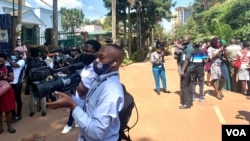Journalists in Kampala Monday walked out of a news conference after a top military officer refused to apologize for injuries meted on journalists covering the campaign trail Sunday. Instead, the police deployed heavily with officers saying they were scared journalists were going to harm them.
On Sunday night, journalists received a text message inviting them to a press conference to be addressed by the chief of defense forces, General David Muhoozi, on Monday morning at Kampala’s Media Center.
However, upon arrival, journalists who had come in large numbers were addressed instead by the political commissar for the Uganda People's Defense Forces, Brigadier General Henry Matsiko.
After speaking about the upcoming 40th anniversary of the UPDF, Matsiko was asked why journalists are being targeted.
Three journalists, including Ali Mivule of NTV Uganda and Ashraf Kasirye of Ghetto TV were hit with tear gas canisters and rubber bullets by security forces on Sunday in the Masaka district.
The journalists were covering a campaign appearance by Bobi Wine, presidential candidate of the opposition National Unity Platform party.
Matsiko lectured the journalists, accusing them of being unprofessional and taking sides in the presidential campaign.
“Even listening to some of you, the way you are presenting yourself, I get an impression that you are moving into a different terrain of activism. And activism has its own dynamics. So, once you’re a journalist, prove to us, that you are exercising professionalism. I have already regretted and I’m saying let us all… please, please,” he said.
The comments caused an uproar and journalists walked out of the news conference.
Abubaker Lubowa, a photojournalist with the Daily Monitor newspaper, says their actions are in solidarity with their hospitalized colleagues.
‘What hurts us, some of us have been covering state functions. But the moment you cover the opposition, then you become a bad journalist. The moment you cover the ruling government, then you’re a very good journalist. So, what should we do in this country? We love our country, but we can’t work under such conditions,” he said.
Michael Kakumiro, another photojournalist, told VOA he has never gotten an apology for a beating he received in 2001 while covering opposition leader Kizza Besigye.
“I have even scars, you can see. Look at my forehead. How about here? I wasn’t born like this. I was covering Besigye. And, it was a combination of police and army that beat me up,” he said.
After walking out of the Media Center, journalists were surrounded by security forces that included 15 police motorcycles, a police pickup truck, local defense unit officers armed with AK-47 rifles and a police holding van.
When asked why they had asked for reinforcement, Brigadier General Flavia Byekwaso, the UPDF spokesperson, characterized the deployment as a mistake.
Journalists insist they will only resume covering security functions once they get an apology from the proper officials.
Uganda votes for a new president on January 14.




